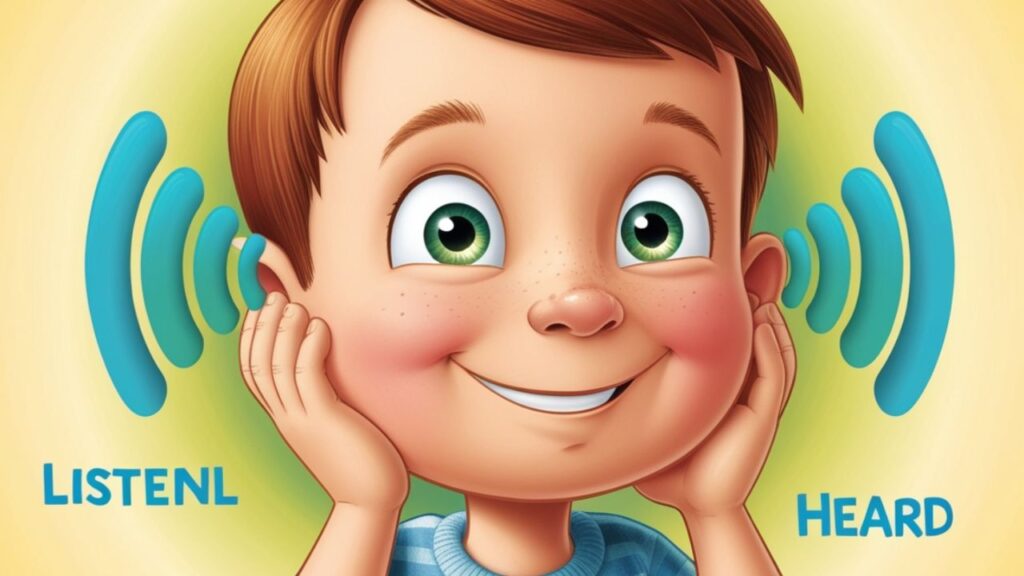Heard shows something you listened to or noticed with your ears. People often use it when they talk about news, sounds, or announcements. Using the right form of this verb helps sentences make sense and keeps your writing clear and correct.
Herd refers to a group of animals, usually cows, sheep, or elephants. It can also describe people moving together in a group. Farmers and workers often manage animals by guiding or collecting the herd, which shows teamwork and organization.
Hurd is uncommon and usually appears as a name or in technology. Most students see it in books, computers, or special projects. Understanding this rare term prevents mistakes, especially when writing formal sentences or reading stories with unusual proper nouns.
Why ‘Heard vs Herd vs Hurd’ Confuses So Many People
Many students get confused because homophones sound the same but have different meanings. Words like heard, herd, and hurd can appear in stories, lessons, or conversations. Knowing their differences helps make reading, writing, and speaking much easier and more accurate.
The confusion grows because some words work as verbs, while others name groups or people. Spelling mistakes or typing errors also add to the problem. Paying attention to context and meaning helps students use the correct word every time without mistakes.
Common Reasons for Confusion:
- All three words sound the same in many accents, making them easy to mix up.
- Only one is a verb in the past tense, while the others serve as nouns or proper names.
- Herd can function as both a noun and a verb, adding to the confusion.
- Hurd is rare and often appears in names or technical terms, so students may not recognize it.
- Spelling mistakes, typing errors, or autocorrect features often cause the wrong word to appear in writing.
Understanding Homophones: Why Sound-Alike Words Exist
Homophones are words that sound the same but have different spellings and meanings. They appear in many stories, lessons, and everyday speech. Learning them carefully helps students read and write correctly while understanding the true meaning of each word.
These sound-alike words exist because English borrows from many languages like Latin, French, and German. Over time, spelling and pronunciation changed, creating words that look different but sound alike. Knowing these patterns improves reading skills and builds confidence in using proper vocabulary.
Why English Has So Many Homophones:
- English borrows many words from other languages like Latin, French, and German.
- Historical spelling changes created words that sound the same but look different.
- Sound shifts over time, such as the Great Vowel Shift, altered pronunciations.
- Some words have multiple meanings but share the same pronunciation.
- Inconsistent spelling rules make it easy for different words to sound alike.
| Homophone Set | Meaning 1 | Meaning 2 |
| Write / Right | To compose text | Correct or a direction |
| Flour / Flower | Baking ingredient | Blooming plant |
| Bare / Bear | Naked or uncovered | The animal |
| Sight / Site | Vision | A location or webpage |
‘Heard’: Definition, Usage, and Everyday Examples
What Does ‘Heard’ Mean?
Heard shows that someone listened to a sound or received information. It often describes news, announcements, or noises. Using this verb correctly helps students speak and write clearly, making sure their sentences are easy to understand and accurate.
This word is the past form of hear. People use it in stories, messages, or conversations to show that something reached their ears. Practicing sentences with this term builds confidence and strengthens reading, writing, and speaking skills in everyday communication.
- Heard is the past tense of the verb hear.
- It shows that someone listened to a sound or received information.
- People use it in stories, messages, or conversations to describe awareness.
- Common phrases include “heard it through the grapevine” and “never heard the end of it.”
- Using it correctly improves communication, reading, and writing skills.
See also : Say Your Piece or Say Your Peace? Correct Usage Guide
Examples of ‘Heard’ in Sentences
- I heard a loud noise outside my window last night.
- She heard about the party from her friends.
- They heard the teacher’s instructions clearly.
- We heard the birds singing in the morning.
- He heard the news on the radio before anyone else.
Common Phrases & Idioms Using ‘Heard’
| Phrase | Meaning |
| Heard it through the grapevine | Received unofficial or gossip-based news |
| Heard from | Received communication from someone |
| Heard of | Know about someone or something |
| Never heard the end of it | Someone kept complaining or reminding about it |
| You heard me | Used to emphasize or repeat a strong opinion |
Some common idioms use this word to talk about news or messages. Phrases like “heard it through the grapevine” or “never heard the end of it” show how people share information in stories, songs, or daily conversations.
These expressions help make speech and writing more interesting. Students can use them to describe hearing news, receiving messages, or learning about events. Practicing these phrases improves speaking skills and makes reading stories easier to understand.
‘Herd’: It’s Not Just About Cows

What Does ‘Herd’ Mean?
- Herd can be a noun meaning a group of animals, like cows, sheep, or elephants.
- It can also be a verb meaning to gather or guide animals or people.
- Farmers often herd livestock to keep them organized and safe.
- The word also appears in behavioral studies to describe people moving together.
- Understanding herd helps in writing clearly about animals, groups, or teamwork.
Real-Life Usage in Business, Society, and Psychology
- In business, companies use the herd effect to influence customer decisions through social proof.
- Marketing campaigns often rely on herd behavior to encourage group trends.
- In society, crowd movements sometimes reflect how people act like a herd.
- Psychology studies show herd behavior can lead to quick, sometimes irrational decisions.
- Leaders observe herd patterns to manage teams and group activities more effectively.
Sentences Using ‘Herd’ (Noun and Verb)
- A herd of elephants crossed the dusty road.
- The farmer herded the sheep into the pen before nightfall.
- Tourists followed the guide like a herd through the museum.
- Workers carefully herded the cattle to the new pasture.
- A herd of deer ran swiftly across the meadow at sunrise.
See also : Hassle or Hastle: Correct Spelling and Usage Guide
The Act of Herding: A Cultural and Economic Essential
Herding isn’t just a verb – it’s an entire profession and tradition.
Case Study: Maasai Herders of Kenya & Tanzania
- The Maasai people rely on cattle as a source of food, wealth, and cultural identity.
- Livestock serves as mobile wealth and a measure of social status within the community.
- Herding skills are passed down through generations, preserving traditional knowledge.
- The Maasai manage large herds across vast grasslands, balancing grazing and sustainability.
- Their practices influence agriculture, culture, and environmental policies locally and internationally.
Wait, Is ‘Hurd’ Even a Word?
Short answer? Yes, but not in the way most people think.
‘Hurd’ in Dictionaries
The word Hurd appears in some dictionaries as a proper name or special term. It does not mean a sound or group like other words. Knowing this helps students read books, articles, or instructions without confusion.
It often shows up in technology, company names, or as a last name. Recognizing it as a unique term prevents mistakes when writing or reading. Using it correctly supports clear sentences and helps learners understand unusual words in English.
Examples of ‘Hurd’ in Real Life
| Use Case | Example or Definition |
| Surname | Douglas Hurd, British politician |
| Technology | GNU Hurd, part of a free OS kernel project |
| Company Names | Hurd Windows and Doors, Wisconsin-based brand |
| Misspelling | Often autocorrected from “herd” or “heard” |
Why ‘Hurd’ Is Commonly Mistyped or Misheard
- Autocorrect often changes “hurd” to “heard” or “herd” in typing apps.
- Voice-to-text tools can misinterpret pronunciation, leading to errors.
- Many people are unaware that hurd is a rare proper noun or technical term.
- Spelling mistakes occur because the letters ‘u’ and ‘e’ are easily switched.
- Its uncommon use in everyday writing makes it confusing for students and learners.
Pronunciation Guide: Heard vs Herd vs Hurd
They all sound similar – so how do we tell them apart?
Phonetic Breakdown (IPA):
| Word | IPA Pronunciation | Rhyming Clue |
| Heard | /hɜːrd/ | Rhymes with bird |
| Herd | /hɜːrd/ | Rhymes with word |
| Hurd | /hɜːrd/ | Identical in most accents |
- Heard: /hɜːrd/ – Rhymes with bird, used as the past tense of hear.
- Herd: /hɜːrd/ – Rhymes with word, refers to a group of animals or people.
- Hurd: /hɜːrd/ – Same pronunciation, mostly seen in names or technology.
- Regional accents in American, British, and Australian English pronounce them very similarly.
- Context and spelling are the main ways to tell them apart when reading or writing.
Mnemonic Tricks to Remember the Difference
- Heard → Think “you hear something with your ears.”
- Herd → Picture a herd of cows or animals moving together.
- Hurd → Remember it is rare, often a name or tech term.
- Visualize the sentence: “I heard the herd, but no Hurd was there.”
- Repeating these mnemonics while reading or writing strengthens memory and prevents mistakes.
Visual Mnemonic:
“I heard the herd, but no Hurd was in sight.”
When Mistakes Matter: Real-Life Consequences

Making a homophone error might seem harmless, but it can cause:
In Business:
- Misusing heard in emails can cause confusion or unclear communication.
- Understanding herd behavior helps marketers influence customer decisions and trends.
- Leaders observe team movements like a herd to manage workflow efficiently.
- Correct spelling of terms like Hurd avoids errors in technical or brand names.
- Clear usage of these words improves professional writing and presentations in the workplace.
In Education:
- Students must spell heard correctly in essays and exams to show proper writing skills.
- Teachers explain herd to describe groups of animals or people in lessons.
- Understanding homophones like these improves reading comprehension and vocabulary.
- Mistaking Hurd for other words can lower marks in tests or assignments.
- Practicing these words regularly strengthens writing, speaking, and language confidence.
In Tech:
- Hurd appears in technology as part of the GNU Hurd operating system kernel.
- Correctly identifying Hurd prevents confusion with herd or heard in documentation.
- Developers must use proper spelling in code comments and manuals to avoid errors.
- Misusing heard or herd can make technical instructions unclear or misleading.
- Understanding these words ensures accurate communication in tech projects and software writing.
Quick Reference Table: Heard vs Herd vs Hurd
| Word | Part of Speech | Definition | Example | Usage Context |
| Heard | Verb (past) | Perceived sound | “I heard the alarm.” | Communication, reporting |
| Herd | Noun / Verb | Group of animals / gather animals | “The farmer herded the cows.” | Agriculture, behavior |
| Hurd | Proper noun | Surname or brand name | “She works at Hurd Systems.” | Names, niche tech |
Mastering These Words in Writing and Conversation
Here’s how to lock this down for good:
Practice Tips:
- Read aloud sentences to hear how each word sounds in context.
- Keep a homophones journal to note tricky words and their meanings.
- Use online quizzes or games to test recognition and usage.
- Write your own sentences using each word correctly every day.
- Review phrases and idioms often to strengthen memory and understanding.
Final Thoughts
Learning the differences between heard, herd, and hurd makes reading and writing much easier. Understanding each word helps students use them correctly in sentences, stories, and conversations, which improves confidence and communication skills every day.
Practicing with examples and phrases strengthens memory and avoids mistakes. Paying attention to spelling and meaning ensures clear writing and speaking. This careful approach builds a strong foundation in English and makes learning fun and successful.
FAQs
Is it hurd or heard?
The correct word is heard when talking about listening. Hurd is rare, usually a name or technical term, not common in everyday writing.
Have herd or heard?
Use heard to show you listened or received information. Herd refers to a group of animals or people, not actions of listening.
What is the meaning of heard and herd?
Heard means you listened to or noticed a sound. Herd refers to a group of animals or people moving together in a group.
Is it correct to say “heard”?
Yes, heard is correct when describing something you listened to or were told. It is the past tense of hear.

Join Bibcia on a journey to master English grammar. Discover easy lessons, writing tips, and practical examples designed to make learning grammar simple and effective.










